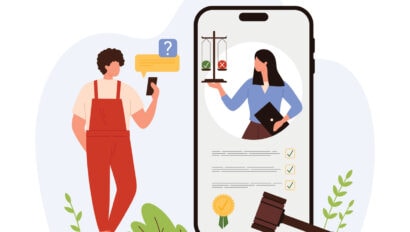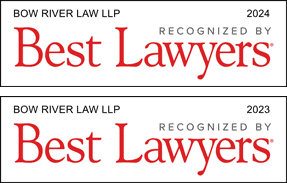- Home
- Services
- Constructive Dismissal
- COVID-19
- Discrimination / Human Rights
- Employee Sued by Employer
- Employment Contracts: Drafting / Review / Negotiation
- Employment Policy Drafting / Review
- Fiduciary Obligations
- Harassment / Bullying
- Independent Contractors
- Just Cause For Termination
- Lay-Offs
- Non-Competition / Non-Solicitation
- Professional Regulation
- Severance Review / Negotiation
- Union / Labour Law
- Workplace Investigations
- Wrongful Dismissal / Unjust Dismissal
- About
- Our Team
- Blog
- Call Now: 587-391-7601
- Contact Us
Alberta Skip Driver Wins Discrimination Claim Against Restaurant

Haverluck v Burger Boy, 2022 AHRC 75 is a new Alberta Human Rights Tribunal decision where a Skip the Dishes Driver (a contractor) made a human rights complaint against a Burger Boy restaurant for not providing him with “services customarily available to the public” when it refused to give him a drink tray for orders with only 1 drink (he has one arm). He won.
This case is potentially important in Alberta, because the specific wording of the Alberta Human Rights Act can make it very difficult for a contractor in a quasi-employment relationship to file a human rights complaint at all, let alone against a third-party that is involved in that relationship somehow.
To illustrate the significance of Haverluck, consider this: the Skip driver was allowed here to make an AHRA complaint against Burger Boy, but for many things would probably not have been allowed to make an AHRA complaint against Skip in Alberta.
Facts
Below are the pertinent facts found by the Alberta Human Rights Tribunal:
- The complainant was a Skip the Dishes (“Skip”) driver
- The complainant had one paralyzed arm, and was unable to grasp things with it
- There was a Burger Boy restaurant situated in part of the geographic area the Skip driver worked and did deliveries in
- The Burger Boy restaurant had a policy of providing drink trays automatically where there were 2 or more drinks in an order, but not automatically if there was only 1 drink in the order
- The complainant needed a drink tray for orders of only 1 drink because of the way he had to store the drinks to carry them and the food together, due to his physical disability
- The human rights complaint was that Burger Boy refused to provide him a drink tray for drinks of only 1 drink, which it ought to have done as an accommodation of his physical disability in providing this “service … customarily available to the public”
- Burger Boy denied refusing to provide him a drink tray in its evidence. The Tribunal found that it had refused to provide it to him
- The complainant explored a few different ways of trying to resolve the issue through Skip, including potentially blocking Burger Boy as a restaurant that he would be prompted to consider deliveries for, but for various reasons he was unable to resolve it that way
- If the complainant did the Burger Boy orders he had a higher chance of a bad delivery which negatively impacted his compensation, and if he refused to do Burger Boy orders it negatively impacted how he was rated internally by Skip, which also negatively impacted his compensation
Analysis / Conclusion
The Burger Boy restaurant did not argue that it was not a “service customarily available to the public” or that that the Alberta Human Rights Act should not apply to this situation. They also did not seriously argue that providing a drink tray for a single-drink order was an unreasonable accommodation of a disability. However, the Tribunal’s choice to decide this matter is potentially quite significant (see “My Take” section, later).
Burger Boy was mainly asserting that the complainant had not asked for the drink trays, so there could not have been any denial of drink trays / discrimination. The Tribunal found that Burger Boy had refused the complainant on several occasions.
The Tribunal found that the refusal to provide drink trays caused an adverse impact on the complainant that was connected to his disability, and that he had suffered injury to his dignity as well. The Tribunal awarded $15,000 in damages for injury to his dignity, reasoning as follows:
[81] Turning to the quantum of damages in this case, I note that damages for injury to dignity are assessed based on the objective seriousness of the respondent’s actions as well as the subjective impact those actions had on the complainant.
[82] In this case, the fact that the discriminatory conduct was repeated over several months increases its objective seriousness. […] On the other hand, I note that, unlike many of the cases before this Tribunal where significant damages awards have been granted, the discrimination in this case did not result in job loss for the complainant. […]
[83] […] Here, the accommodation sought, providing a disposable drink tray estimated to cost $0.50, was eminently simple, making the failure to provide it less forgivable.
[84] Turning to the subjective component, the complainant clearly experienced some level of embarrassment and upset as a result of the respondent’s conduct. […]
My Take
The Tribunal’s choice to decide this matter is potentially quite significant because some might argue that to construe Section 4 of the AHRA as allowing a contractor to sue a third-party customer in human rights is not in harmony with other major Alberta cases which have not allowed the use of the more obvious section of the AHRA – Section 7 – for the same purpose.
Section 7 of the AHRA deals with discrimination in employment practices. It has wording that is different than the equivalent section in some other provinces. In Alberta, no “employer” shall discriminate on employment grounds, whereas in other provinces such as B.C., no “person” shall discriminate on employment grounds. The difference in wording seems minor, but it has led to a distinction in the law between Alberta and some other provinces:
- Under Section 7 of the ARHA, a worker experiencing discrimination on a worksite can only sue his or her “employer”, and not third parties, for that discrimination: Lockerbie & Hole Industrial Inc. v Alberta, 2011 ABCA 3
- Under B.C.’s equivalent section, a worker experiencing discrimination on worksite to sue a third-party for discrimination even when that third-party is not their employer: BCHRT v Schrenk, 2017 SCC 62
Some might argue that the Schrenk decision, coming as it does from the SCC and after Lockerbie, should have the effect of expanding the ability of a complainant to use Section 7 to sue third parties in Alberta. However, the difference in wording is distinct and I am unaware of that argument succeeding so far in Alberta.
Bow River Law provides these regular legal blog articles for the purposes of legal education and research for the public and the legal profession. These articles should be considered general information and not legal advice. If you have a legal problem, you should speak to a lawyer directly.
Bow River Law is a team of knowledgeable, skilled and experienced lawyers handling employment law, human rights (discrimination) and labour law matters. Bow River Law is based in Calgary but we serve Alberta. Let us help you.
Recommended Reading

Constructive Dismissal Consultation Discrimination Employment Contracts Employment Law Severance Workplace Investigations
A Guide to Employment Lawyer Consultation in Calgary, Alberta
When facing employment issues, finding the right legal support is crucial. At Bow River Law, we offer experienced employment law…
10 July 2024

